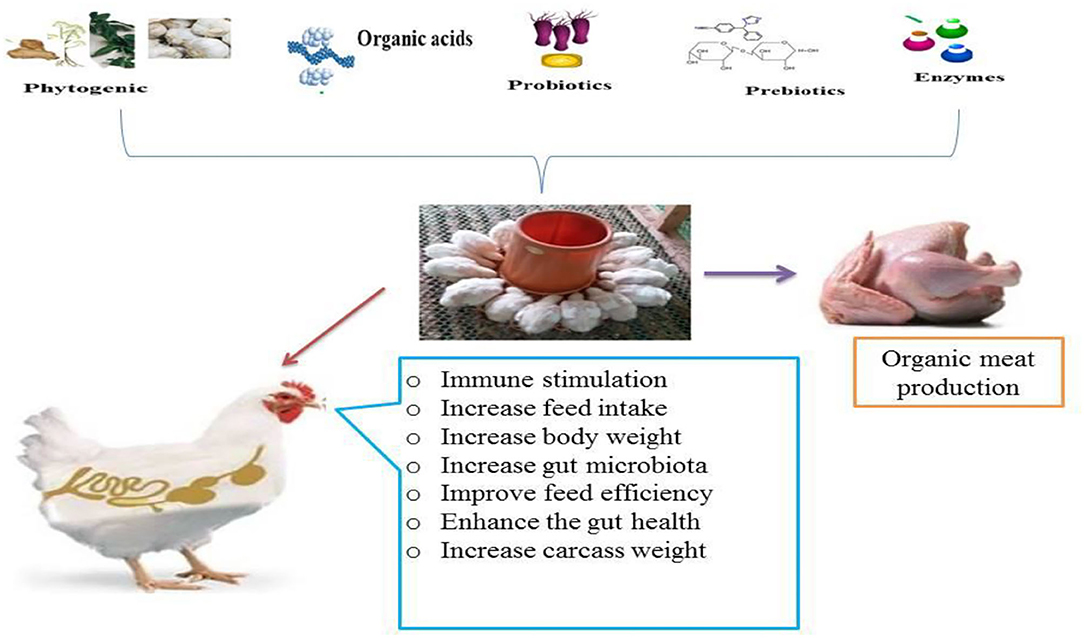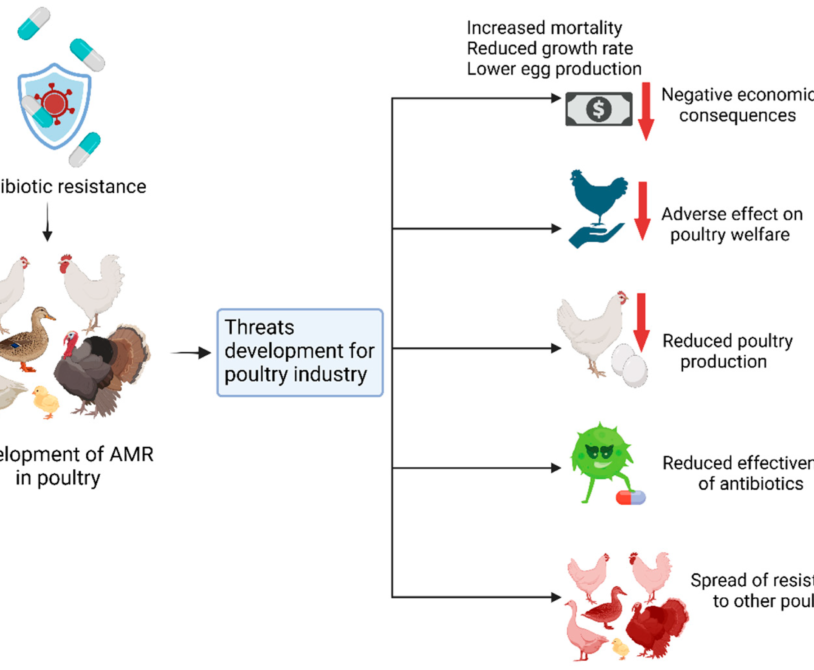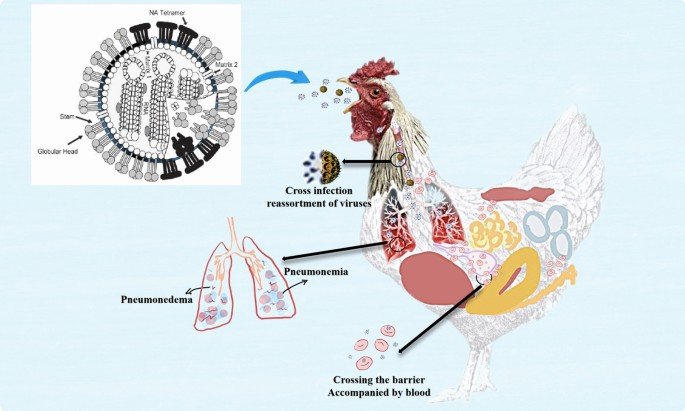The poultry industry is huge, with broiler production growing fast. Broiler meat is loved for its taste, health benefits, and low fat. But using antibiotics to make chickens grow faster worries many.
People want meat without antibiotics. So, farmers are looking for natural ways to help chickens grow well. This article will look at natural options like plant extracts, prebiotics, and enzymes. We’ll see how they can make broiler farming better and healthier.
Key Takeaways
- The poultry industry is one of the largest food industries globally, with broiler production showing exponential growth.
- The use of antibiotics as growth promoters in broiler production has raised concerns about antibiotic resistance and consumer preferences for antibiotic-free poultry products.
- This has prompted a search for natural alternatives to antibiotics in broiler farming, including phytogenic feed additives, prebiotics, probiotics, and enzymes.
- Sustainable and healthy broiler production can be achieved through the use of these natural alternatives to antibiotics.
- The article aims to explore the current use, mode of action, and feeding strategies of different natural alternatives to antibiotics in the poultry industry.
Introduction
The poultry sector is a huge part of the food industry worldwide. Broiler production has seen huge growth in meat consumption and profits. Broiler meat is loved for its taste, low-fat content, and quick production time.
Antibiotics have been used to boost production and protect birds. But their misuse has caused problems like antimicrobial resistance and pollution. This has led to a move towards antibiotic-free broiler meat.
This review looks at using natural alternatives in broiler production. We’ll explore phytogenic groups, prebiotics, probiotics, and enzymes. These options help the poultry industry produce safe, high-quality meat. They also address concerns about antibiotic use in poultry.
Current Scenario of Antibiotic Use
Antibiotic Consumption Patterns
The use of antibiotics in poultry varies worldwide. China, a big user of antibiotics in livestock, has seen a drop in recent years. Yet, the use of antimicrobials in animals is expected to rise globally, especially in Russia, Brazil, China, India, and South Africa.
Antibiotics like tetracyclines, sulfonamides, and penicillins are often used. The EU and China banned antibiotics as growth promoters due to antibiotic resistance concerns. Now, there’s a focus on using feed additives as alternatives to improve poultry health and performance.
| Country | Antibiotic Use in Poultry (% of Producers) |
|---|---|
| Ghana | 97% |
| Nepal | 90% |
| Nigeria | 89% |
| Bangladesh | 98% |
| United States | 40% |
The poultry sector is expected to grow by 121% of 2005 levels by 2050. Broiler production has skyrocketed, from 9 to 132 million tons between 1961 and 2019. This growth has led to a big increase in antimicrobial use, which is set to rise by 67% by 2030, mainly in emerging markets.
“Antimicrobial consumption is predicted to increase by 67% by 2030, with significant increases expected in Russia, Brazil, China, India, and South Africa.”
Feed Additives as Antibiotic Alternatives
The poultry industry is looking for ways to use fewer antibiotics. Feed additives are seen as natural solutions to improve broiler health and performance. These additives are added to the diet to make it better for the animals.
Feed additives like phytogenic feed additives (essential oils, herbal extracts, organic acids), prebiotics, probiotics, and enzymes are being explored. They could help reduce death rates and improve how well broilers do without harming the environment or people’s health.
Phytogenic Feed Additives
Phytogenic feed additives (PFA) include essential oils and plant extracts. They help with growth, nutrient use, and gut health in poultry. Research shows PFA can fight off harmful bacteria and improve health.
Studies also found PFA can make the gut work better, helping animals absorb more nutrients. A study with 432 broiler chicks showed PFA helped them grow more than those on regular or antibiotic diets.
Probiotics and Enzymes
Probiotics, like Bacillus subtilis, change the gut’s bacteria, helping with health and performance. Enzymes help break down nutrients, making feed more efficient.
Natural additives like phytogenic compounds, probiotics, and enzymes are good alternatives to antibiotics. They help broilers perform better and stay healthy without harming the environment or people.
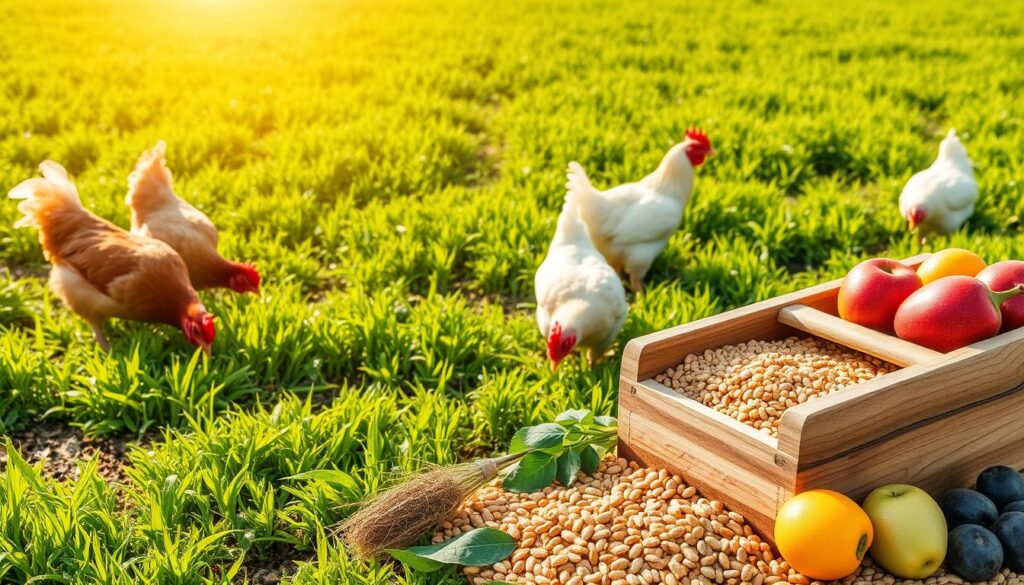
| Feed Additive | Mode of Action | Potential Benefits |
|---|---|---|
| Phytogenic Feed Additives | Antimicrobial, Modulate Gut Microbiota, Enhance Digestive Function | Improved Growth Performance, Nutrient Digestibility, Gut Health |
| Probiotics | Alter Gut Microbiome Composition | Enhanced Gut Health and Broiler Performance |
| Enzymes | Improve Nutrient Digestion | Increased Feed Efficiency |
Exploring Natural Alternatives to Antibiotics for Broiler Chickens
The poultry industry faces big challenges with antibiotic resistance and the need for antibiotic-free products. Natural alternatives like phytogenic feed additives, prebiotics, probiotics, and enzymes are being researched. They could improve broiler health and meet consumer demands without using traditional antibiotics.
Phytogenic feed additives, made from plants, show promise in boosting broiler health. For example, black cumin seed oil (BCSO) can reduce necrotic enteritis, a common disease. Studies found that BCSO lowered disease scores and death rates in broilers.
Prebiotics and probiotics are also being studied for their gut health benefits. Clostridium-based bacterial spore (CBCS) and bacteriophage treatments have shown to lower necrotic enteritis scores. They also promote a balanced gut flora without significant changes in the cecal microbiota.
Enzymes like xylanase and phytase are being researched for their role in improving nutrient use and gut health. They help break down complex carbs and phytic acid, making nutrients more available to broilers.
The demand for sustainable, antibiotic-free poultry is growing. Natural alternatives offer a promising solution for the poultry industry. By using phytogenic feed additives, prebiotics, probiotics, and enzymes, producers can focus on holistic, environmentally-friendly feeding. This approach prioritizes broiler health and meets consumer needs.
| Treatment | Necrotic Enteritis Lesion Score | Mortality Rate |
|---|---|---|
| Black Cumin Seed Oil (2-5 mL/kg) | 1.6% | 1.6% |
| Black Cumin Seed Oil (Cp#4 strain) | 35.9% | 35.9% |
| Black Cumin Seeds + Kefir | N/A | 14.1% |
| Clostridium-based Bacterial Spore + Bacteriophage | Significantly lower than the positive control | N/A |
| Positive Control | 51.6% | 31.3% |
“The combination treatment of CBCS and bacteriophage did not have any significant characterizing genera in the cecal microbiota, suggesting a broader, more balanced gut flora.”
Phytogenic Feed Additives
Types and Sources
Phytogenic feed additives come from plants. They include herbs, spices, botanicals, oleoresins, and essential oils. These natural options are becoming popular as a way to reduce antibiotic use in animal farming.
Herbs are plants with medicinal properties and strong smells. Examples are oregano, thyme, and rosemary. Spices, like garlic, cayenne, and cinnamon, are used for flavor and preservation.
Botanicals are plant parts used in medicine. Essential oils, from plants, are used in perfumes and medicines. Oregano, thyme, peppermint, and citrus are common in poultry production.
Phytogenic feed additives are gaining favor for their natural benefits. They offer a sustainable option for poultry feeding strategies. As research grows, so will the use of botanicals and essential oils in poultry farming.
“The use of phytogenic feed additives in poultry production represents a promising approach to promote animal health and productivity while addressing the growing concerns over the use of antibiotics.”
Benefits of Phytogenic Feed Additives
Improved Intestinal Function and Growth Performance
Studies show that adding phytogenic feed additives to broiler diets is very beneficial. These plant-based compounds can make intestines work better, help chickens grow faster, and keep them healthier.
These additives boost how well chickens digest food and grow in weight. They also fight off harmful bacteria and reduce inflammation. This improves the health of the gut and helps chickens grow better.
Phytogenics work by affecting how chickens eat and process nutrients. They help chickens use nutrients more efficiently. This leads to better growth and feed efficiency.
Using phytogenic feed additives also helps fight antibiotic resistance. This is important as more people want to buy products without antibiotics. Adding phytogenics to chicken feed is a good way to meet this demand.
“Phytogenic feed additives have demonstrated remarkable potential in enhancing broiler health and performance, making them a valuable alternative to conventional antibiotics.”
Mode of Action of Phytogenic Feed Additives
Phytogenic feed additives, or phytobiotics, are natural alternatives to antibiotics in chicken feed. They come from plants and are known for their antimicrobial properties, antioxidant effects, and immunomodulatory benefits. Understanding how they work is key to improving chicken growth and health.
These additives help control how chickens grow and stay healthy. They affect the chicken’s metabolism, like how it uses fats and proteins. This leads to better feed efficiency and growth performance.
Phytogenic feed additives also have antimicrobial properties to keep the gut healthy. Their antioxidant effects protect against oxidative stress. Plus, they boost the chicken’s immune system, making it stronger against diseases.
Phytogenic feed additives are a promising alternative to antibiotics. As the industry looks for sustainable ways to feed chickens, more research is needed. This will help us fully use these natural solutions.
Prebiotics and Probiotics
Prebiotics and probiotics are key for broiler chickens’ health. Prebiotics are food for good gut microbes. Probiotics are good bacteria that fight off bad ones in the chicken’s gut.
Adding prebiotics and probiotics to broiler food can greatly improve their health. These natural options are better than antibiotics for growing healthy chickens.
Gut Health and Immune Function
Prebiotics, like inulin, feed the good bacteria in the chicken’s gut. This helps the good bacteria grow, making the gut healthier. Probiotics add more good bacteria, like Lactobacillus and Bifidobacterium, to the gut.
Good gut health from prebiotics and probiotics boosts the chicken’s immune system. This helps prevent diseases and keeps the flock healthy.
Broiler Performance and Production
Prebiotics and probiotics improve gut health and immune function. This leads to better growth and production in broilers. They eat more efficiently, grow faster, and produce more.
The poultry industry is looking for new ways to replace antibiotics. Prebiotics and probiotics are a good solution. They keep chickens healthy and provide antibiotic-free meat to consumers.
| Metric | 2015 | 2023 | 2035 Projection |
|---|---|---|---|
| Poultry Meat Production (million metric tons) | 115.27 | 139.68 | 185.41 |
| Poultry Meat Consumption Growth Rate | – | – | 65% |
| Pork Production (million metric tons) | 122.11 | 122.07 | – |
“Probiotics, prebiotics, and phytoextracts significantly reduce antibiotic usage, enhance poultry meat quality, improve fat profile, prevent spoilage, extend the shelf life of fermented poultry products, and add health benefits to poultry meat.”
Enzymes
Enzymes are key in making feed easier for broiler chickens to digest. They break down complex parts of feed like starch and proteins. Adding extra enzymes to feed can make chickens grow better and use feed more efficiently.
Using enzymes in feed is seen as a natural way to replace antibiotics. These enzymes help release nutrients like amino acids and minerals. This leads to better growth, feed use, and health in broilers.
Enzymes work by breaking down big food molecules into smaller, easier-to-absorb nutrients. This helps overcome issues like anti-nutritional factors that block nutrient absorption. By improving digestibility and nutrient use, enzymes help chickens perform better and need fewer antibiotics.
| Enzyme Type | Function | Targeted Nutrient |
|---|---|---|
| Carbohydrases | Break down complex carbohydrates (e.g., cellulose, hemicellulose, β-glucans) | Carbohydrates |
| Proteases | Hydrolyze proteins into smaller peptides and amino acids | Proteins |
| Phytases | Liberate phytate-bound phosphorus and other minerals | Phosphorus, Minerals |
Using enzymes in feed, along with natural options like prebiotics and probiotics, is a sustainable way to raise broilers. These natural aids improve digestibility and nutrient use. They help chickens grow well, keep their gut healthy, and reduce antibiotic use. This leads to better animal care and trust from consumers.
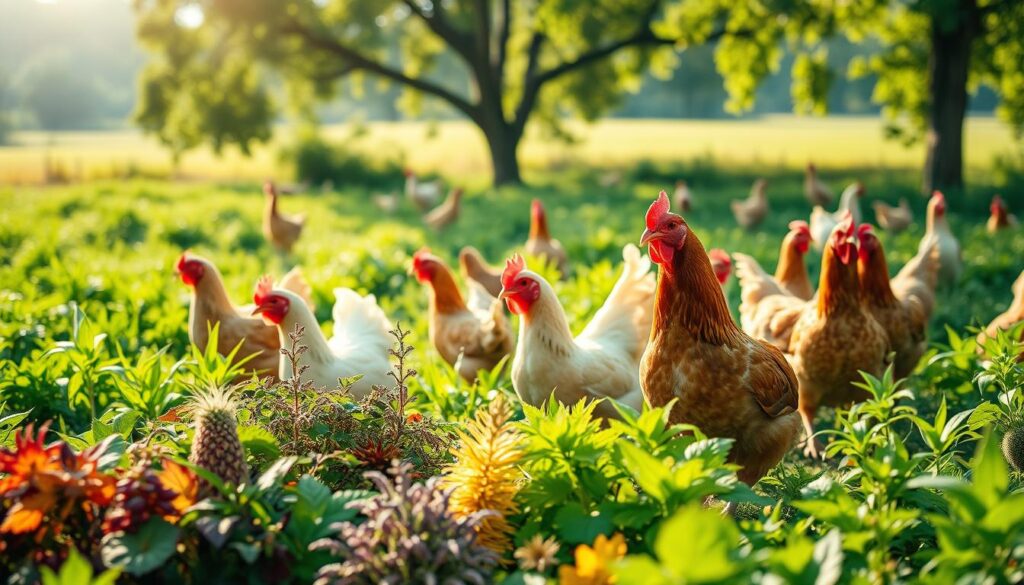
Sustainable Feeding Strategies
Organic Farming and Consumer Preferences
More people want chicken without antibiotics. This has led to looking for natural ways to feed chickens. Organic farming is one way to do this. It doesn’t use antibiotics, hormones, or synthetic chemicals.
Organic farming uses clean and safe practices. It also focuses on feeding chickens well from the start. This helps their gut health and reduces the need for antibiotics.
New ways to feed chickens are being tried. These include using natural additives and improving how chickens digest food. These methods help keep chickens healthy without antibiotics.
| Feeding Strategy | Benefits |
|---|---|
| Phytogenic Feed Additives | Antimicrobial properties, improved intestinal function |
| Prebiotics and Probiotics | Promote beneficial gut bacteria, enhance gut health |
| Enzymes | Improve nutrient digestibility, reduce substrate availability for microbes |
The chicken industry is changing to meet consumer needs. It’s using natural ways to feed chickens. This way, it can offer antibiotic-free poultry that people want.
“Embracing sustainable feeding strategies and organic farming practices is not just a trend, but a necessity in meeting the evolving consumer demands for natural, antibiotic-free poultry products.”
The poultry industry is working hard to use fewer antibiotics in broiler production. This is because more people want safe and sustainable chicken products. Natural alternatives like phytogenic feed additives, prebiotics, probiotics, and enzymes are showing great promise.
These natural additives help broilers grow better and stay healthy. They also improve gut health. This is good news for those who want antibiotic-free poultry products.
Using these natural alternatives to antibiotics can help the broiler industry grow. It ensures food is safe and good for the environment. Studies have shown that plant-based additives like rosemary, thyme, and ginger are very effective.
They make broilers healthier, reduce antibiotic-resistant bacteria, and improve growth. But they don’t harm the quality of the chicken.
The demand for safe and sustainable chicken is getting higher. The poultry industry needs to keep finding new natural alternatives to antibiotics. This will help meet consumer needs and keep the industry profitable.
More research and using these sustainable feeding practices are key. They will help the broiler industry succeed in the long run in the United States.
FAQ
What are the main natural alternatives to antibiotics explored for broiler chickens?
The main natural alternatives include phytogenic feed additives, prebiotics, probiotics, and enzymes.
What are phytogenic feed additives, and how do they benefit broiler performance?
Phytogenic feed additives come from plants. They are herbs, spices, botanicals, and essential oils. These additives improve the gut, increase nutrient retention, and boost growth. They also have antimicrobial, antioxidant, and anti-inflammatory effects.
How do prebiotics and probiotics contribute to broiler gut health and performance?
Prebiotics help beneficial gut microbes grow. Probiotics are the good bacteria that fight off pathogens. Together, they improve gut health, boost immunity, and enhance performance.
What is the role of enzymes as natural feed additives in broiler production?
Enzymes, like carbohydrases and proteases, help digest feed better. This makes more nutrients available for the broilers. It also improves their overall performance.
How do sustainable feeding strategies involving natural alternatives contribute to antibiotic-free broiler production?
Using natural alternatives like phytogenic feed additives, prebiotics, probiotics, and enzymes is a sustainable way to raise broilers. It meets consumer demand for antibiotic-free and eco-friendly poultry. Organic farming supports these natural feeding strategies.


